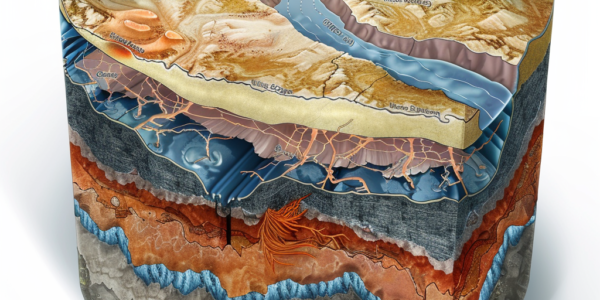Scientists Discover Massive Subterranean Ocean 400 Miles Underground
Recent study reveals a massive subterranean ocean 400 miles underground, challenging our understanding of the planet’s water cycle. The water is located in the mantle transition zone and was discovered through tectonic wave measurements. This challenges previous beliefs about the distribution of water within the Earth.
Debating the Possibility of Life in Venus’ Clouds
Could life exist within Venus’ voluminous clouds? New research suggests that it might be possible. Despite the harsh conditions on Venus’ surface, scientists are debating the possibility of life in the planet’s clouds. Recent research has raised questions about the potential for life in its atmosphere, with the detection of phosphine in Venus’ atmosphere sparking discussions about the presence of life. A new paper explores the possibility of microscopic life existing and reproducing in water droplets in Venus’ clouds, challenging our perceptions of where life could exist beyond Earth.
Russian Man Claims to be Reincarnated Martian on Mission to Save Earth
27-year-old Boriska Kipriyanovich claims to have been born on Mars and reincarnated on Earth with a mission to save humanity from a nuclear apocalypse. His assertions about advanced Martian technology and the potential threat of nuclear warfare have sparked discussions about the possibility of life on other planets and the fate of humanity.
2024 Total Solar Eclipse: A Celestial Spectacle
Get ready for the celestial spectacle of a total solar eclipse on April 8, 2024. Skywatchers across the world will be captivated as the moon passes between the Earth and the sun, casting a shadow on the Earth’s surface. The total solar eclipse is anticipated to begin at approximately 10:15 AM EDT and will progress across North America, providing a breathtaking view for onlookers. Observers within the path of totality will experience a surreal moment as the sky turns dark, and the stars and planets become visible in the daytime sky. Whether planning a trip to a prime viewing location or observing from your own backyard, the 2024 total solar eclipse promises to be a remarkable experience for all who gaze skyward.
NASA Observes Strong Solar Flare from the Sun
The Sun emitted a strong solar flare, peaking at 4:56 p.m. ET on March 28, 2024. Solar flares can impact radio communications, electric power grids, navigation signals, and pose risks to spacecraft and astronauts. This flare is classified as an X1.1 flare, denoting the most intense flares. To see how such space weather may affect Earth, please visit NOAA’s Space Weather Prediction Center, the U.S. government’s official source for space weather forecasts, watches, warnings, and alerts.
Geopolitical Significance of the Moon Sparks Interest and Exploration
The upcoming total eclipse of the sun by the moon has sparked a renewed interest in the geopolitical significance of the moon. George Friedman, a renowned geopolitical analyst, has taken this rare celestial event as an opportunity to delve into the intricate relationship between the moon, Earth, and humanity. In addition to the cosmic significance, Friedman is in the process of writing a book on the geopolitics of the moon, prompting him to explore early thoughts on the subject. The moon’s profound connection to Earth, its potential as a source of valuable minerals and solar energy, and its strategic opportunities for exerting influence and control over Earth are all key points of interest in understanding the geopolitical significance of the moon.
Total Solar Eclipse to Grace Skies of United States in 2024
Get ready for the rare celestial event of a total solar eclipse gracing the skies of the United States on April 8, 2024. The eclipse will traverse North America, spanning regions of Mexico, the U.S., and Canada, with the optimal vantage point for observing the total solar eclipse being along the path of totality. Thirteen states fall within this path, with numerous communities making preparations to host eclipse watch parties in anticipation of the influx of visitors.
Global Warming Impacting Earth’s Rotation and Timekeeping
Global warming is causing polar ice melt, impacting the Earth’s rotation and timekeeping. A recent study reveals that the need for a ‘leap second’ is being delayed by three years due to the effects of melting polar ice, pushing it from 2026 to 2029. This unprecedented shift in the Earth’s rotation underscores the influence of global warming on time standards and the importance of understanding climate change on a global scale.
The Future of Space Exploration Relies on Emerging Technologies
The future of space exploration relies on innovative technologies promoting reusability, safety, and longevity. A recent white paper emphasizes the need for developments to mitigate space debris, refuel satellites, and reuse rockets. The report also highlights emerging debris management technologies, such as the use of lasers to alter the path of space junk and controlled systems for adjusting orbits to concentrate debris falloff in specific areas.
NASA’s Billion-Dollar Mission to Stop Potentially Devastating Asteroid
NASA paid a man $1 billion to prevent the potentially devastating asteroid Bennu from hitting Earth. The mission involved sending a spacecraft to retrieve a sample from the asteroid’s surface, providing valuable insights into potential disaster preparedness. The catastrophic impact of Bennu crashing into Earth would result in devastating consequences, highlighting the importance of ongoing research and initiatives in planetary defense.










